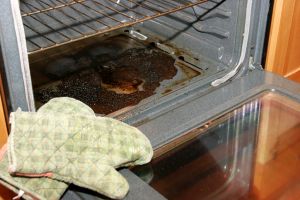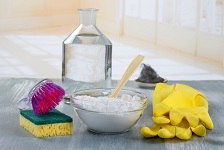As they’re designed to make quick work of some of the toughest and most neglected messes and stains in the home, oven cleaners can contain some pretty rough ingredients. That leaves you with two options – make your own, or buy from brands that focus on environmentally-friendly, low-irritation ingredients.
Commercial natural oven cleaners can be pretty hard to find, unfortunately. On the upside, a DIY solution is super simple, with ingredients you probably already have at home plus a solid serving of elbow grease.
First thing though – check if your oven has a self-cleaning function. Many newer ovens do. If you’re lucky enough to have a self-cleaning oven, you probably don’t even need this article. For the rest of us who have older or less expensive ovens which don’t clean themselves, read on for a guide to natural oven cleaning.
Why use natural oven cleaners?

One of the biggest problems with regular oven cleaners is that they can be harmful to those with lung and skin sensitivities. For example, many people with severe asthma have a hard time with oven cleaners, especially as reaching in to properly scrub off that grim can put your face quite close to a surface covered in an irritating product.
There are also environmental concerns associated with using such corrosive cleaning products that could be harmful to wildlife and ecosystems.
When it comes to DIYs, there are a further two benefits: expense and simplicity. Store-bought oven cleaners can be quite expensive, while the method we describe below costs mere cents. Using the same simple ingredients for a wide range of cleaning applications helps clear out the cupboard – as opposed to having loads of highly specialised cleaners cluttering up space.
What can I use to clean my oven naturally?

All you need to make your own natural oven cleaner is baking soda (aka sodium bicarbonate), white vinegar, warm water, and a bit of dishwashing liquid. That’s it!
Baking soda and vinegar are excellent DIY natural household cleaning staples, which can be used to clean virtually anything (apart from wood floors or natural stone).
When you combine the two, they’re very good at breaking down grease, grime, and stains. It may take a little longer and a bit more scrubbing to get the same results as a store-bought oven cleaner, but it can be worth the trade-off – it won’t make you cough up a lung in the process! As a bonus, the combo is a great odour neutraliser, helping make your kitchen smell as well as look fresh.
How to clean your oven naturally
- Pull out all of the racks and trays, and soak them in hot or warm water and dish soap for a few hours.
- While the racks are soaking, add 4 spoons of baking soda to a spray bottle, fill the rest with warm water, and shake it up until the baking soda is dissolved. Spray liberally on all internal oven surfaces (bottom, roof, sides and door), taking care around the heating elements.
- Let this soak for an hour – if grime is still solidly stuck on, spray again and leave for another hour.
- Wipe out with warm water and a cloth. It can be handy to use a spatula for hard-to-reach places or scraping out built-up.
- If the oven still has grime left over, wipe everything down with a mix of white vinegar and warm water. The vinegar will react with the baking soda and further dissolve grime.
- Rinse and dry the oven racks, and put them back in the oven.
What if it’s still not clean?

If you’ve got a really, really gross oven but are determined to stay away from harsh chemicals, here’s a more intensive version of the DIY natural oven cleaning method.
- Rather than a diluted spray, mix baking soda with water to form a paste consistency. Spread this across the oven surfaces (not the heating elements), and rub it in. Don’t be afraid to layer it on extra thick!
- Let this sit overnight, or for at least 12 hours.
- Scrape and wipe out everything that’s been loosened – a damp cloth can help.
- Spray white vinegar over all surfaces.
- Wipe out the oven again. You may need to do a second spray with vinegar (or vinegar diluted with warm water) to get everything out.
Ready to tackle that messy oven?
If you’re wary of the monster messes waiting for you in the deepest recesses of the oven, you might want to don a pair of rubber gloves. This is hands down one of the dirtiest jobs you’ll need to do to keep your kitchen in top shape, apart from perhaps cleaning out the drains.
You can use this same method for most household cleaning tasks. However, bear in mind that baking soda can damage stone and vinegar may not be good for wood. If in doubt about whether or not the bicarb and vinegar method is suitable for a particular cleaning task, do your research first.
Original Author: April Broadbent

Share this article